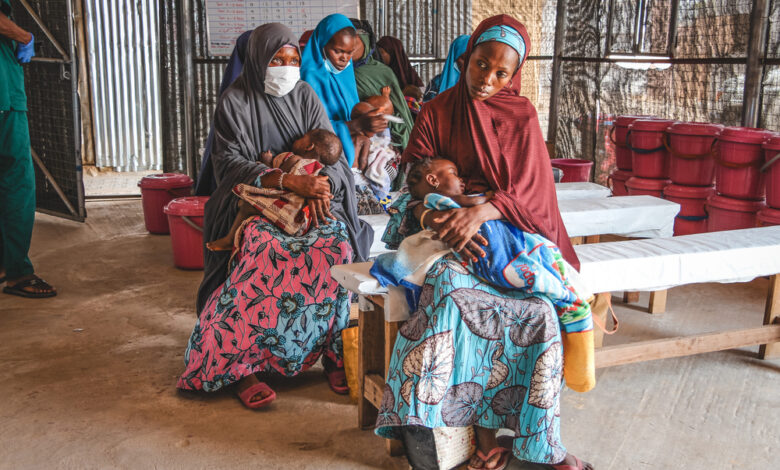Borno State Having More Children With Acute Malnutrition – MSF
MSF said there had been a high number of malnourished children between May and June compared with previous years, suggesting an alarming nutritional crisis in Borno state.

Médecins Sans Frontières (MSF) has revealed that Borno State, Northeast Nigeria, has been witnessing many malnourished children in its nutrition centre in Maiduguri.
The MSF noted that malnutrition is a chronic and multi-faceted concern in Borno State and is driven by the cumulative impact of displacement, insecurity, food inflation, poverty, lack of access to healthcare, and health status.
A statement on Friday, July 1, signed by Shaukat Muttaqi, MSF head of mission in Nigeria, revealed that for six weeks in May and June, even though the peak hunger gap season had barely begun, more malnourished patients arrived than at any time since the project opened in 2017 – including at the very peak of the season in previous years.
Muttaqi added that MSF’s outpatient therapeutic feeding programme saw a 25 per cent increase in enrolments compared to last year.
“Previous trends tell us the worst is still to come. This represents a big flashing warning sign. Unless urgent steps are taken to prepare for the looming peak, people in Maiduguri will suffer deadly consequences.”
“It is critical that action is taken now, in advance of the seasonal malnutrition peak, to avoid an even worse situation. Our facility is overwhelmed with more patients than we’ve ever seen every month since 2017.”
Muttaqi revealed that so far this year, MSF admitted 2,140 malnourished children for hospital care in their inpatient therapeutic feeding centre (ITFC), representing about 50 per cent more than from the same period last year.
MSF said 32 per cent of the malnourished children admitted were children living with internally displaced families who are bearing the brunt of rising food prices.
In response, MSF extended its existing ITFC capacity from 120 beds to 200 beds to help reduce the number of acute malnutrition recorded in the area.
Despite emergency measures taken to reduce the cases of malnutrition, beds were not enough for malnourished children admitted for some days in June. MSF said other humanitarian organisations have also been operating fully or beyond their capacities.
“Due to lack of funding, some humanitarian organisations have had to reduce services due to a lack of funding – including the closure of 16 much-needed outpatient therapeutic feeding centres. As a result, and if current trends continue, services will be overwhelmed, and many more malnourished children will be at risk of dying,” Muttaqi said.
The charity organisation cited the case of Hussaina Ali, whose youngest child is undergoing treatment at the ITFC due to malnutrition. She told MSF that her children never got vaccinated apart from their immunisation at birth.
“My four-year-old son becomes sick during the rainy season every year. There is no free medical facility in our area, so I just take him to the pharmacy and get medicine there,” Ali said.
Suggesting an alarming nutritional crisis in Borno State, MSF calls for an urgent scale-up of the humanitarian response in advance of the ‘hunger gap’ peak period, which could be much more severe than in previous years.
“We need to see an increase in hospital capacity for treatment of malnourished children, but that must also be met with a scale-up of interventions at the community level to get ahead of a potential worst-case scenario,” Muttaqi said.
“That means expanding outpatient feeding programmes, food security, immunisation, and access to water and hygiene.
“Dr Htet Aung Kyi, the MSF medical coordinator in Nigeria, said, “As the traditional peak of the lean season is approaching, Borno is standing on the edge of a crisis that could put the lives of children in danger.”
“An urgent scale-up of the nutritional response is needed, and humanitarian organisations have to be prepared to tackle malnutrition by scaling up the medical response but also preventing health threats such as measles, cholera and other infectious disease outbreaks.”
Support Our Journalism
There are millions of ordinary people affected by conflict in Africa whose stories are missing in the mainstream media. HumAngle is determined to tell those challenging and under-reported stories, hoping that the people impacted by these conflicts will find the safety and security they deserve.
To ensure that we continue to provide public service coverage, we have a small favour to ask you. We want you to be part of our journalistic endeavour by contributing a token to us.
Your donation will further promote a robust, free, and independent media.
Donate HereStay Closer To The Stories That Matter




